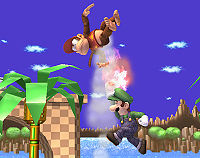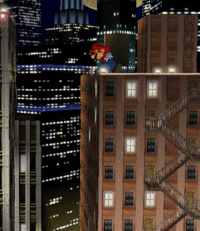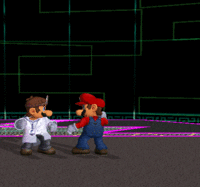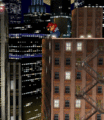Super Jump Punch: Difference between revisions
No edit summary |
(Undid edit by 24.91.49.51:) |
||
| Line 91: | Line 91: | ||
*This move is occasionally referred to as "Pay-Day Punch" given that Nintendo Power magazine gave this name to the move in its review for ''[[Super Smash Bros.]]'', due to the coins flying out of the enemy when dealing [[damage]]. This is a reference to the move Pay Day in the ''[[Pokémon]]'' games. | *This move is occasionally referred to as "Pay-Day Punch" given that Nintendo Power magazine gave this name to the move in its review for ''[[Super Smash Bros.]]'', due to the coins flying out of the enemy when dealing [[damage]]. This is a reference to the move Pay Day in the ''[[Pokémon]]'' games. | ||
*Prior to ''Smash 4'', the coins that appear are 2D sprites that always face the screen on the pause menu. | *Prior to ''Smash 4'', the coins that appear are 2D sprites that always face the screen on the pause menu. | ||
Revision as of 15:30, September 7, 2015
| Super Jump Punch | |
|---|---|
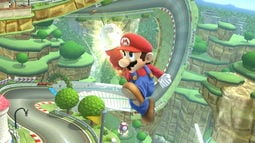 Mario performing his Super Jump Punch in Super Smash Bros. for Wii U. | |
| User | Mario Luigi Dr. Mario |
| Universe | Mario |
| Article on Super Mario Wiki | Jump |
| “ | "Attack opponents while jumping or leap to get back to the ledge." | ” |
| —Melee's instruction manual | ||
| “ | "Jump while attacking. Useful in recoveries." | ” |
| —Brawl's instruction manual | ||
| “ | "Jump up to hit opponents multiple times." | ” |
| —Smash 3DS's foldout | ||
The Super Jump Punch (スーパージャンプパンチ, Super Jump Punch) is Mario and Luigi's up special move that they can perform in the Smash Bros. games. Dr. Mario also shares this move with them in Super Smash Bros. Melee and Super Smash Bros. 4. It is executed by pressing the special button while holding the control stick or d-pad upwards; thus, it is their up special move. When performed by either of the "Marios," they jump up diagonally with more vertical range than horizontal; if the attack strikes an enemy during the jump, coins fly out of the enemy, and the foe receives multiple hits for up to about 12% damage. The last hit of the attack deals a little knockback, but it can Star KO opponents if used near the upper blast line (especially in Brawl).
Users
Mario
When Mario uses this attack coins fly out and each hit inflicts 1% damage. The average total damage caused is around 10-13%. This move had moderate knockback in Melee, but is more powerful in Brawl. The move is often a rather poor recovery overall due to its short range and being easily edgeguarded (with the exception of the Super Jump Punch in SSB64, which has a great vertical range (enough to go from the main platform of Dream Land to the top platform) and decent horizontal range if aimed forward). However, using Cape can slightly aid Mario's horizontal recovery, making recovering a little easier. Cape, combined with Super Jump Punch's lightly horizontal and mainly vertical range will give Mario a fair horizontal recovery, though the attack's normal angle will make it a terrible move to use vertically in some situations below the ledge. It is possible to "aim" both Mario's Super Jump Punches straight up vertically by holding the Control Stick in the opposite direction that they are facing during the "spark" of the Super Jump Punch's animation and can be angled more horizontally as well by aiming the control stick or D-Pad forward.
Luigi
| “ | "A rising punch that can deal great damage at the start of the move." | ” |
| —Smash for 3DS's foldout | ||
Luigi's sourspotted Super Jump Punch only deals 1 point of damage, and only makes a character flinch very slightly. However, if the attack's sweet spot hits a character, it becomes a powerful Fire Jump Punch which deals around 25% damage with high knockback and can KO an opponent at 60% damage or higher. Luigi can turn around after the initial hitbox, however, its usefulness is questionable. In Super Smash Bros., his Super Jump Punch sends him upwards and forwards, but the horizontal movement after the move is performed is low. In Super Smash Bros. Melee, Luigi's attack sends him vertically upward without any horizontal range, forcing him to rely on his Green Missile and Luigi Cyclone for horizontal recovery. In Super Smash Bros. Brawl, Luigi has more horizontal movement after the move but has more landing lag compared to his Melee Super Jump Punch. The Fire Jump Punch if used in the air is slightly weaker than if used on the ground (20% rather than 25%). It is possible to combo with it by small jumping, performing an neutral aerial, and then using a sweetspotted punch at percentages around 40% with many characters. When sourspotted, it can be used to steal KOs, as it will give Luigi the point without changing their trajectory.
In Melee, the Luigi Ladder can be performed, where two Luigis hit each other with the sourspots of the attack and can rise infinitely, even above the upper blast line.
Dr. Mario
When Dr. Mario performs the attack in Melee, coins fly out of the enemy, and the attack deals about 12% damage. Dr. Mario's version of the attack is the same as Mario's, but is more powerful, and scores fewer hits. Also, the sound effect uses generic "hit" sounds rather than the usual sound made when Mario grabs a coin. Using the cape to aid his version of the recovery is less noticeable and less helpful than Mario's because of its lag, sending Dr. Mario up and forward only once.
In Smash 4, Dr. Mario's Super Jump Punch strikes with a single, solid hit with a sweetspot at the start of the attack that does 13% damage, with a sourspot at the move's apex that does 7% damage. Basically, it behaves as a less extreme version of Luigi's.
Customization
In Super Smash Bros. 4, Mario, Dr. Mario, and Luigi each receive two custom variations of the Super Jump Punch. These variations are:
Mario/Dr. Mario
- Super Jump: Leaves a trail behind Mario/Dr. Mario, sacrificing damage for increased vertical recovery distance.
- Explosive Punch (Mario) / Ol' One-Two (Dr. Mario): Produces fire and explosive damage. It does two hits, 8% damage for the first hit and 13% damage for the second. A powerful KOing option. However, vertical recovery is reduced and the move can't be aimed horizontally.
- In Super Smash Bros. for Nintendo 3DS, this variation is a Challenge unlock for Mario, only obtainable by getting a score of at least 200000 in Target Blast.
Luigi
- Fiery Jump Punch: Sweetspot is larger and easier to hit with, but weaker, lacking the distinctive ping sound. Doesn't rise as high.
- Burial Header: Loses the sweetspot but gains a new attack after the initial jump - Luigi falls much faster and can bury grounded opponents, allowing for potential followups. With good positioning, the sourspot can combo into the descending hit at high percents.
Mario using the Super Jump in Super Smash Bros. for Nintendo 3DS
Mario using the Explosive Punch in Super Smash Bros. for Nintendo 3DS
Dr. Mario's Super Jump in Super Smash Bros. for Wii U
Ol' One-Two in Super Smash Bros. for Wii U
Origin
The Super Jump Punch is a unique special move in that it is based on a very simple technique used by the Mario Bros.-- the jump. In the original Super Mario Bros., Mario and Luigi used their jump to cross gaps, stomp on enemies (such as Koopa Troopas and Goombas), and break bricks or hit blocks to reveal coins or power-ups (such as Super Mushrooms and Fire Flowers). The Super Jump Punch is based on Mario and Luigi's ability to reveal multiple coins from blocks with a jump; this is seen when Mario, Dr. Mario (in Melee), or Luigi use the attack on a foe. Coins are the currency of the Mushroom Kingdom in the Mario series. The coins that appear previously used their design from Super Mario 64, up until Smash 4, where their design was altered to be similarly designed to the Star Coins from the New Super Mario Bros. series.
Techniques
Super Jump Punch wall jump
In Melee, if Mario is right next to a wall, the Super Jump Punch can be cancelled into a wall jump by tapping the opposite direction Mario is facing immediately after Mario begins to turn around after reaching the apex of his jump. If Mario happens to be knocked very low while next to the wall on stages such as Yoshi's Story (such as when recovering from a meteor smash), this technique is rather useful. It isn't easy to utilize however, due to requiring Mario to be right next to the wall before using the move.
Up-B cancel
In Melee, Dr. Mario can cancel his Super Jump Punch. To perform it, a player must have Dr. Mario use his Super Jump Punch and then during the first four frames, quickly move the control stick in the opposite direction. Another way the player can do it is to use Super Jump Punch so Dr. Mario would jump backwards and then press the control stick downward during the first few frames of the animation. This can be used for combos (similar to Fox's Reflector) or to shield cancel and punish the opponent for approaching or for trying to break the player's shield; its set knockback, however, means that it cannot potentially KO opponents.
Gallery
- JumpSMB.jpg
Mario's jumping animation from Super Mario Bros.
Mario's Super Jump Punch on Ness in Melee.
Luigi's Super Jump Punch in Super Smash Bros. for Wii U.
Dr. Mario's Super Jump Punch in Super Smash Bros. for Wii U.
Video (Mario)
<youtube>wSYBG_1gmFE</youtube>
Trivia
- In Melee, the appearance of the coins is the same as the original SSB, but the coins for the Trophy Lottery look similar as well as the Game Over screen. Also, these same coins are used on the Game Over screen in Brawl's Adventure or Classic Modes to continue, as well as the Coin Launcher. Lastly, there is a Coin trophy (Melee).
- This move is occasionally referred to as "Pay-Day Punch" given that Nintendo Power magazine gave this name to the move in its review for Super Smash Bros., due to the coins flying out of the enemy when dealing damage. This is a reference to the move Pay Day in the Pokémon games.
- Prior to Smash 4, the coins that appear are 2D sprites that always face the screen on the pause menu.
